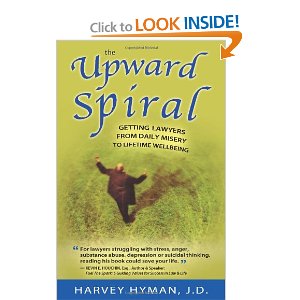I do not consider myself a lawyer. I am a human being who took on the role and career of a lawyer for 25 years. Unlike some people who entered law school with a burning passion to practice law, I ended up there because I was confused about my career direction and had no career counseling. Stop here. If you don’t feel excitement and joy when thinking about a career my hindsight advice is don’t enter it!
After a couple of years in NYC working for a small firm I quit because I hated following orders due to my anti-authoritarian streak dating back to early childhood. When I left for California I passed the CA bar exam, worked briefly for a solo practitioner, and then opened up my own solo practice. During my first few years I took whatever I could get including cases involving wrongful employment termination, wrongful eviction, workers compensation, and personal injury. I gradually steered my practice completely into plaintiff’s personal injury because I come from a family of physicians and I was truly fascinated by the medical aspects of these cases.
After I while I became rather successful as a lawyer, especially because I had a nose for what made a good case, I enjoyed investigating the facts, I cared about my clients (most of them anyway), and I frequently knew more about the medical/psychological aspects of the client’s injury than the defense. My Achilles heel was my biological tendency toward anxiety and depression which, to my mind, are two sides of the same coin.
Although I got excellent results in my cases I was plagued by fears of failure and so I worked myself to the bone when it came to preparing for depositions, hearings, and trials or opposing motions to compel discovery or obtain summary judgment. Although I was never sued by a client in 25 years I always worried that the innately disgruntled ones who complained about everything in their lives might sue me. So I worked extra hard to make sure their cases turned out well. To put in all these hours I gave up on exercise, sat more, and ate unhealthy, high salt, high sugar foods to give me some compensatory pleasure. Stop. If you are doing these things you will damage your physical and mental health. Our bodies crave outdoor exercise in the fresh air and they crave real food, not the processed crap made in factories.
At the beginning of the 1990s I took on some new challenges. I moved to a larger, more expensive office. I became a homeowner. And, my wife became pregnant with our first child. In the mid-1990s, I developed a bridge phobia, a phobia involving the fear I would fall out of the window of a tall office building, and panicky dread over crime in our neighborhood which seemed to be getting worse every day. To help myself through these irrational fears I became a good friend of Jack Daniels. This nearly led my wife to divorce me. The threat of divorce woke me up like a cold shower. I went to see a psychiatrist who put me on Zoloft and I stopped drinking. Things got better. We had a second child, a son. In the coming years I became a very good father. I adore my kids. They adore me. Both kids are flourishing. This is something I am very proud of.
In the decade between 1995-2005 I handled an increasing number of cases involving traumatic brain injury and made significant income. Initially these cases were very exciting. Over time they became a drag. Why? The defense, which had paid up relatively quickly in the early days, now used scorched earth tactics by hiring experts in human factors, biomechanics, neurology, psychiatry, neuropsychiatry, neuroradiology, etc. I had to hire counter experts in each field and I had to pay to depose every over-priced, hostile defense expert who gave me all their specious reasons why each client was a neurotic, a hysteric or a malingerer.
I felt like Sisyphus, the man condemned by the gods to roll a boulder up a steep hill every day. The litigation costs drained my coffers to the point where I was late on my rent, my copier machine rental, my records fees, and witness fees every month. In the midst of these depressing circumstances my mother suddenly died of a brain virus. And then, one day, my wife noticed we were completely out of money and our home equity lines were maxed out. I instantly plunged into what my psychiatrist called a psychotic depression in which I heard a voice from within me tell me to die over and over again, relentlessly 24/7 until after 4 days of it, I went to a hospital emergency room.
The psychiatrists who cared for me in the hospital told me I had snapped as a result of an inborn vulnerability to depression, years of stress from legal practice, and the trauma of my mother’s death and insolvency. They told me never to return to legal practice. My past 8 years have been a journey back from severe depression and into a new, more fulfilling life. Thanks to a private, own-occupation disability policy I was able to pay my family’s living expenses while recovering.
I researched and wrote my book for lawyers, The Upward Spiral: Getting Lawyers from Daily Misery to Lifetime Wellbeing, on stress and depression while studying and practicing Buddhist meditation. I became ordained as an interfaith chaplain and sat with dying patients at a local hospital. More recently I entered an MS program in mental health counseling at Capella University. I anticipate becoming a Licensed Professional Clinical Counselor at the beginning of 2017. I am finding my studies, practicums, and internships in mental health graduate school to be very meaningful and fulfilling.
Law is a very stressful profession which produces severe depression in one out of every five lawyers. What is my message to my colleagues in the law who suffer depression?
First, face the depression. Do not deny it and self-medicate it with unhealthy substance or behavioral addictions.
Second, try medication. For a depression with obsessive, suicidal rumination (like mine) it can be life-saving.
Third, see a therapist (a psychologist, MFT, counselor or social worker) so you can explore and understand the bio-psychosocial roots of your depression and choose the best form of therapy to resolve your depression.
Fourth, consider couples counseling or family therapy so your spouse and children can understand your depression and have an opportunity to educate you as to how it is affecting them. This can lead to improved understanding, communication, and cooperation at home within the family system.
Fifth, consult experts in nutrition, exercise, and sleep to develop ways for you to eat healthier, exercise more, and sleep better. A wonderful book on these topics is Go Wild by Dr. John Ratey.
Sixth, spend more time in nature because there is nothing better to quiet the mind, ease the sore psyche or restore the spirit.
Seventh, take time to actualize your potential as a unique self through whatever activity calls to you, be it photography, calligraphy, water color painting, baking, cooking, etc.
Good luck. I know you can beat depression and be happier.
Harvey Hyman, J.D. spent 25 successful yet stressful years practicing personal injury law in New York and California. Thanks to an episode of severe depression in 2007, he found happiness and joy that had always eluded him.










